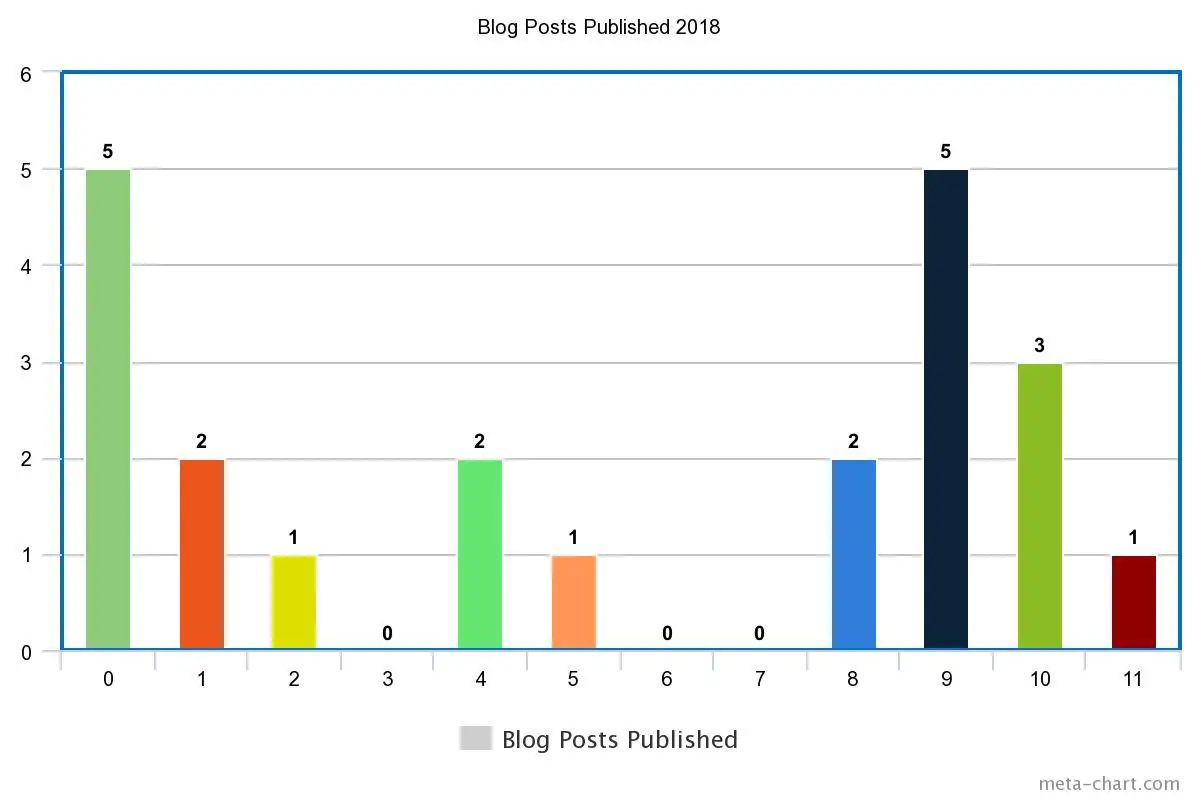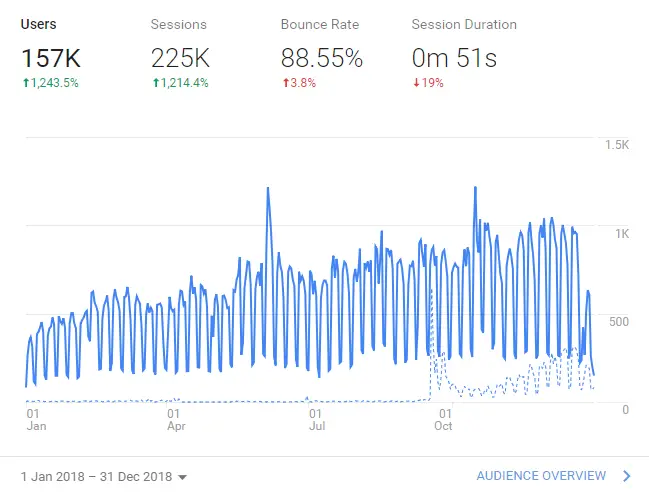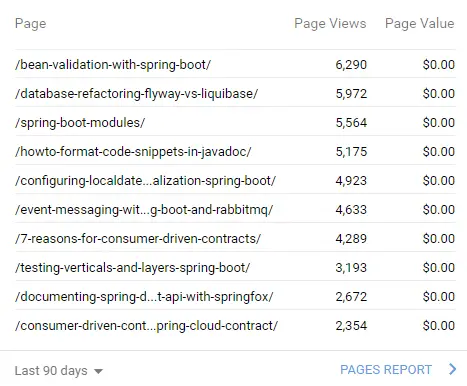It’s easiest to review things if they are measured. So, in this post, I’ll try to measure as much of my year 2018 in hindsight to draw a conclusion to this year and then make plans for the next.
The following will include statistics of my blog and my professional life as well as some more personal things about my year 2018. I hope it’s a mix that’s interesting to you :).
The Blog
Let’s start with the obvious: some facts and figures about this blog.
This year, I wanted to seriously start producing content for reflectoring, but I actually produced less articles than in 2017. In 2018, I published 22 blog articles, including this one:

However, the blog had more than 150.000 unique visitors in 2018, which is a lot more than the meager 11.000 of 2017 (the blog was only included in Google Search in September 2017, though).
With about 1.000 unique visitors per week, the blog has now twice the weekly visitors it had in the beginning of 2018:

As for the content, I experimented a bit with pretty generic software engineering tips and tricks, but the content most valuable to my readers seem to be hands-on tutorials that scratch a specific itch, especially in combination with Spring Boot, which is not unexpected since the usage of Spring Boot skyrocketed in the last couple years.
Thus, my by far most successful article this year is an in-depth tutorial on all aspects of Bean Validation with Spring Boot:

For the next year, I’ll concentrate on high-quality Spring Boot tutorials that provide a real hands-on value starting with a series about Testing.
Editorial Work
One reason I was not as productive as I wanted with the blog is that I started editorial work for baeldung.com.
I reviewed 95 baeldung articles with a total of 66.342 words in 2018. This is just about as much as a short novel!
The editorial work gives me ample opportunity to learn new stuff about the Java ecosystem, which is why I’d like to keep it up.
In 2019, I will drastically reduce the work load, though, to free up more time for my other endeavors.
The Book
As the members of my mailing list may know, I have started writing on a short eBook with hands-on advice on how to build a software in a “Clean Architecture” style.
I was underwhelmed with the online resources on this topic (and with the print resources, too, for that matter). All articles I found discuss “Clean Architecture” or “Hexagonal Architecture” on a very generic level without going into the details on how to actually implement such an architecture.
The goal of my book is to fill this gap with my interpretation of a hands-on “Clean Architecture”. Members of my mailing list will get early access for free within the next months, so sign up now if you haven’t done so yet!
Work on the book has been slow in the two months since I started (I have no more than 2 chapters to show), but I’m going to dedicate the time I free up from other activities.
Talks
2018 was the year in which I held the most talks at conferences, yet. I held 6 talks at public software development conferences all over Germany and one at the internal summIT conference of my employer, adesso.
Here’s the list of my talks in 2018. Feel free to get in touch if you’re interested in one of the topics:
- Best of REST, Softwerkskammer Ruhrgebiet
- Contracts Can Be Fun, 3-hour Workshop on Consumer-Driven Contracts at MicroExchange, Berlin
- Best of REST, JAX, Mainz
- Open Source @ Work, Java Forum Stuttgart
- Open Source @ Work, Herbstcampus, Nürnberg
- Contracts Can Be Fun, Full-Day Workshop on Consumer-Driven Contracts at API Conference, Berlin
- Clean Architecture, adesso summIT
I have already submitted a talk on the topic of a “Clean Architecture” at a couple of conferences in 2019, so I hope that 2019 will be just as active as 2018 in this regard.
Also, I already have two speaking engagements about the topic of hands-on software development and software erosion in two university classes where I will hopefully transport some hands-on software development experience to the students.
Articles
This year, I wrote only two pieces that were published aside from my blog:
- Architecture Decisions in a Software Development Team on simpleprogrammer.com
- Vertrag dich mit Microservices - Integration von Microservices mit Consumer-Driven Contracts testen, entwickler magazin 4.2018 (German Print Magazine)
I don’t have any plans on publishing aside from my blog (and my book) in 2019, yet, so I’ll be opportunistic in this regard.
Reading & Listening
Now to the more personal things: which (audio) books have I read and listened to in 2018?
As of yet, I have never kept track of my reading, but I often wanted to know if and when I have read a certain book. So, as a new habit, I’ll list the books I have been reading.
As you’ll see, I’m a fantasy and sci-fi nerd and I like to read series so that I don’t have to learn a whole new universe each time I start a new book:
- Blackcollar: The Judas Solution by Timothy Zahn
- Blackcollar: The Backlash Mission by Timothy Zahn
- Blackcollar by Timothy Zahn
- The Slow Regard of Silent Things by Patrick Rothfuss
- The Wise Man’s Fear by Patrick Rothfuss
As for non-fiction, I have been reading these two books:
- Deep Work by Cal Newport
- Clean Architecture by Robert C. Martin
Both of these books have influenced the way I think about my work, so I can recommend them very much.
Since my commute to work and back takes about 1.5 to 2 hours every work day, I have been a very active audio book listener this year. These are the books I listened to. No surprise, a lot of sci-fi and fantasy:
- Warbreaker by Brandon Sanderson
- QualityLand by Marc-Uwe Kling
- Skyward by Brandon Sanderson
- The Singularity Trap by Dennis E. Taylor
- Edgedancer by Brandon Sanderson
- Oathbringer by Brandon Sanderson
- Words of Radiance by Brandon Sanderson
- The Way of Kings by Brandon Sanderson
- It by Stephen King
- Enceladus by Brandon Q. Morris
- Artemis by Andy Weir
- Tuf Voyaging by George R. R. Martin
- Omni by Andreas Brandhorst
- Giants' Star by James P. Hogan
- The Gentle Giants of Ganymede by James P. Hogan
- Inherit the Stars by James P. Hogan
Wow, I wasn’t aware of how much time I seem to spend driving. I’ll try to squeeze in more home office days in 2019.
Video Games
And here’s the list of video games I have played in 2018. I haven’t played as much as in the years before (mostly due to the other activities listed above), but I have managed to get some shallow video gaming into my schedule:
- Darkest Dungeon
- The Banner Saga 3
- XCOM 2: War of the Chosen
- Fortnite (until I realized it swallowed too much of my time)
- Steamworld Dig 1 & 2 (together with my son)
- Into the Breach
- Faster than Light
No real blockbuster game this year (except perhaps for Fortnite), as I was afraid of spending too much time in the games.
I will choose my games very carefully in 2019, so as not to let them eat up my time too much.
Conclusion
In conclusion, 2018 was a fun year for me, especially with the many speaking opportunities.
However, I definitely felt the drain on my time by all the different activities so that some activities, like nursing my blog, did not get the attention I wanted them to have.
So, my new year’s resolutions are as follows:
- I will measure how much time I spend with each activity and how productive I am in each activity to be able to prioritize consciously. It’s actually very much like setting up a monitoring infrastructure for a software product. Since I’m a great advocate of monitoring I wonder why I haven’t applied this concept to my professional life earlier… .
- I will reduce my blogging to high-quality and in-depth Spring Boot tutorials for the time being.
- I will finish my eBook “Getting Your Hands Dirty on Clean Architecture” within the first half of 2019.
- I will schedule my time aggressively and schedule as many home office days as possible to gain more time on “deep work”.
That’s it for 2018. I wish a happy year to all of my readers and hope that you will meet your goals for 2019.



